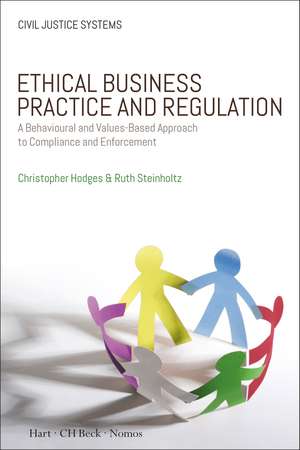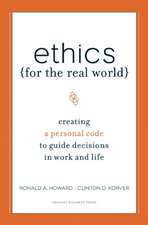Ethical Business Practice and Regulation: A Behavioural and Values-Based Approach to Compliance and Enforcement: Civil Justice Systems
Autor Professor Christopher Hodges, Ruth Steinholtzen Limba Engleză Paperback – 27 dec 2017
Din seria Civil Justice Systems
- 23%
 Preț: 473.21 lei
Preț: 473.21 lei - 29%
 Preț: 611.74 lei
Preț: 611.74 lei - 28%
 Preț: 437.47 lei
Preț: 437.47 lei - 27%
 Preț: 471.88 lei
Preț: 471.88 lei - 29%
 Preț: 792.98 lei
Preț: 792.98 lei - 29%
 Preț: 586.76 lei
Preț: 586.76 lei - 30%
 Preț: 607.74 lei
Preț: 607.74 lei - 27%
 Preț: 442.90 lei
Preț: 442.90 lei - 30%
 Preț: 724.24 lei
Preț: 724.24 lei - 30%
 Preț: 548.54 lei
Preț: 548.54 lei - 18%
 Preț: 307.88 lei
Preț: 307.88 lei - 18%
 Preț: 308.19 lei
Preț: 308.19 lei - 17%
 Preț: 330.69 lei
Preț: 330.69 lei - 30%
 Preț: 511.23 lei
Preț: 511.23 lei - 18%
 Preț: 633.92 lei
Preț: 633.92 lei
Preț: 242.07 lei
Preț vechi: 291.51 lei
-17% Nou
Puncte Express: 363
Preț estimativ în valută:
46.32€ • 48.48$ • 38.55£
46.32€ • 48.48$ • 38.55£
Carte tipărită la comandă
Livrare economică 31 martie-14 aprilie
Livrare express 21-27 februarie pentru 86.82 lei
Preluare comenzi: 021 569.72.76
Specificații
ISBN-13: 9781509916368
ISBN-10: 1509916369
Pagini: 352
Dimensiuni: 156 x 234 x 32 mm
Greutate: 0.58 kg
Editura: Bloomsbury Publishing
Colecția Hart/Beck
Seria Civil Justice Systems
Locul publicării:London, United Kingdom
ISBN-10: 1509916369
Pagini: 352
Dimensiuni: 156 x 234 x 32 mm
Greutate: 0.58 kg
Editura: Bloomsbury Publishing
Colecția Hart/Beck
Seria Civil Justice Systems
Locul publicării:London, United Kingdom
Caracteristici
Provides a brief, comprehensive introduction to the key concepts in Ethical Business Regulation for a wide popular audience.
Notă biografică
Christopher Hodges is Professor of Justice Systems and Supernumerary Fellow of Wolfson College, Oxford; and Head of the Swiss Re/CMS Research Programme on Civil Justice Systems at the Centre for Socio-Legal Studies, Oxford.Ruth Steinholtz is an international values-based business ethics advisor; Founder and Managing Partner of AretéWork LLP; and former General Counsel, Group Security Coordinator and Head of Ethics of Borealis AG.
Cuprins
Part I: The Ideas1. Why Do People Conform to Rules or Break Them? Piecing Together the Evidence 2. Characteristics to Build on 3. The Traditional Way of Enforcing the Law: Deterrence 4. Fair and Proportionate Measures 5. The Need for Cooperation 6. Trust Within and in Organisations 7. How to Learn and Improve Performance: An Open Culture without Blame 8. Why Should We Be Ethical? Ethical Business Practice as Sound Commercial Strategy Part II: Where We are Now9. The Status of Corporate Governance 10. The Status of Regulatory Policy Part III: What is Ethical Business Regulation?11. Ethical Business Regulation 12. Developing Examples of Ethical Regulation Part IV: How to Implement Ethical Business Practice and Ethical Business Regulation13. The Cultural and Leadership Framework for Ethical Business Practice in Organisations 14. The Ethics and Compliance Framework: Values Orientation
Recenzii
Finally, a new paradigm in compliance and regulation that gets to the heart of what truly matters--values-based and ethically-based leadership. In the 21st century who you are, how you behave, and what you stand for are destined to become the new frontiers of competitive advantage. Success in the future will be all about the culture the leaders create.
This book makes an insightful case for business to benefit from being values-driven rather than focussed on short-term profits, and for promoting an open, just culture rather than a blame culture. It also convincingly contends that while business regulators must take closing businesses and deterrence seriously, deterrence can also have counterproductive effects. This is a book rich in lessons about how we can all learn how to build more ethical corporate cultures.
In this long overdue, much needed and wonderfully practical book, Christopher Hodges and Ruth Steinholtz have provided a guide for both business practitioners and regulators that lays out the rationale, a mindset and a roadmap for a more realistic, more honest and ultimately more productive working relationship between these two powerful societal players. The book remains remarkably readable and engaging while providing a solid foundation of insights-from both science and real world experience-into the factors that encourage as well as discourage ethical human behavior. The central argument at the book's heart is the simple yet powerful idea that deterrence and adversarialism have not and will not serve to build the trust-based relationships between the public and the private sectors upon which a productive and mutually beneficial functioning of our economy relies-and that cooperation and a mutual learning orientation will. Although their book targets regulators and business practitioners, its lessons provide a critical key for beginning to address the wide-ranging challenges at the heart of our world's current larger spiral of distrust, fear, resentment and retaliation. Hodges and Steinholtz have done us all a great service.
After every institutional failure, the cry goes up for more ethical behaviour from more ethical individuals. But where are such people to be found? How would you identify them? Where do they come from-and what militates against them? This book sets itself the ambitious goal of analysing what ethical businesses look like and how they behave. It doesn't dodge the hard questions or promise simplistic solutions but dares to look fearlessly at the most important questions of our age.
Hodges and Steinholtz have done a great service to business. Ethical Business Practice and Regulation is a must-read for all leaders eager to drive sustainable social and economic growth by infusing their organisation with value and integrity. The authors' inspirational vision of a better business world - indeed a better society - can be realised with this practical guide.
There is a clear and present danger that the economic regulation of utilities becomes ever more invasive and prescriptive. Such a path is undesirable, limiting the discretion and authority of senior management and resulting in a much reduced focus on the needs of the customer.Chris Hodges' Ethical Business Regulation (EBR) concept has provided the Scottish water industry an opportunity to break out of this pattern of ever decreasing circles. EBR has offered an unique opportunity to explore, constructively and collaboratively, the thorniest of regulatory issues and to do the right thing for customers, our environment and our society.
Regulation is fundamentally about how people in organisations actually behave. This book pulls together the evidence on "what works" in getting the right results. There is a wealth of material here for smart regulators who are pursuing effectiveness through actual outcomes, not compliance with rules for its own sake.
In a time where ethical behaviour is increasingly under attack by various governments around the world, Hodges and Steinholz provide a very timely guide to the importance of the culture of compliance in organizations. Hodges and Steinholz consider the essence of ethical and compliant behaviour asking, "Why do people observe rules? Why do people break them"? The writers take the reader through a well-organized and compelling journey from biological and physiological influences through to the need for governing agencies and businesses to interact on a relationship of trust. This is critically important because, as the writers clearly articulate in chapter 7, people will not come forward to report ethical breaches if they feel they will be putting themselves at undue personal risk. I truly believe Ethical Business Practice and Regulation: A Behavioural and Based Values Based Approach to Compliance and Enforcement is not only essential reading for ethics and compliance professionals, but rather everyone who is engaged in business on some level. Read it and encourage your colleagues to read it too!
This book makes an insightful case for business to benefit from being values-driven rather than focussed on short-term profits, and for promoting an open, just culture rather than a blame culture. It also convincingly contends that while business regulators must take closing businesses and deterrence seriously, deterrence can also have counterproductive effects. This is a book rich in lessons about how we can all learn how to build more ethical corporate cultures.
In this long overdue, much needed and wonderfully practical book, Christopher Hodges and Ruth Steinholtz have provided a guide for both business practitioners and regulators that lays out the rationale, a mindset and a roadmap for a more realistic, more honest and ultimately more productive working relationship between these two powerful societal players. The book remains remarkably readable and engaging while providing a solid foundation of insights-from both science and real world experience-into the factors that encourage as well as discourage ethical human behavior. The central argument at the book's heart is the simple yet powerful idea that deterrence and adversarialism have not and will not serve to build the trust-based relationships between the public and the private sectors upon which a productive and mutually beneficial functioning of our economy relies-and that cooperation and a mutual learning orientation will. Although their book targets regulators and business practitioners, its lessons provide a critical key for beginning to address the wide-ranging challenges at the heart of our world's current larger spiral of distrust, fear, resentment and retaliation. Hodges and Steinholtz have done us all a great service.
After every institutional failure, the cry goes up for more ethical behaviour from more ethical individuals. But where are such people to be found? How would you identify them? Where do they come from-and what militates against them? This book sets itself the ambitious goal of analysing what ethical businesses look like and how they behave. It doesn't dodge the hard questions or promise simplistic solutions but dares to look fearlessly at the most important questions of our age.
Hodges and Steinholtz have done a great service to business. Ethical Business Practice and Regulation is a must-read for all leaders eager to drive sustainable social and economic growth by infusing their organisation with value and integrity. The authors' inspirational vision of a better business world - indeed a better society - can be realised with this practical guide.
There is a clear and present danger that the economic regulation of utilities becomes ever more invasive and prescriptive. Such a path is undesirable, limiting the discretion and authority of senior management and resulting in a much reduced focus on the needs of the customer.Chris Hodges' Ethical Business Regulation (EBR) concept has provided the Scottish water industry an opportunity to break out of this pattern of ever decreasing circles. EBR has offered an unique opportunity to explore, constructively and collaboratively, the thorniest of regulatory issues and to do the right thing for customers, our environment and our society.
Regulation is fundamentally about how people in organisations actually behave. This book pulls together the evidence on "what works" in getting the right results. There is a wealth of material here for smart regulators who are pursuing effectiveness through actual outcomes, not compliance with rules for its own sake.
In a time where ethical behaviour is increasingly under attack by various governments around the world, Hodges and Steinholz provide a very timely guide to the importance of the culture of compliance in organizations. Hodges and Steinholz consider the essence of ethical and compliant behaviour asking, "Why do people observe rules? Why do people break them"? The writers take the reader through a well-organized and compelling journey from biological and physiological influences through to the need for governing agencies and businesses to interact on a relationship of trust. This is critically important because, as the writers clearly articulate in chapter 7, people will not come forward to report ethical breaches if they feel they will be putting themselves at undue personal risk. I truly believe Ethical Business Practice and Regulation: A Behavioural and Based Values Based Approach to Compliance and Enforcement is not only essential reading for ethics and compliance professionals, but rather everyone who is engaged in business on some level. Read it and encourage your colleagues to read it too!









